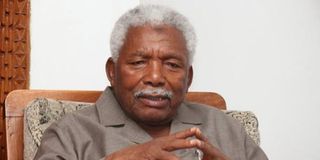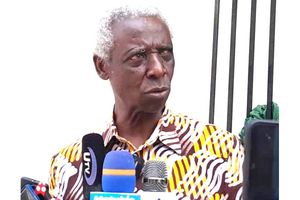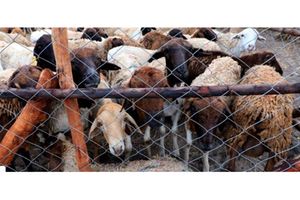Why Mzee Mwinyi is the ‘father’ of free media

Retired President Ali Hassan Mwinyi
At the very outset, I must be categoric that I am a firm proponent of media freedom anywhere on this planet.
For this reason, it profoundly pains me to think about how Tanzania so carelessly fell into the hands of the previous John Magufuli-led government. Not a single red flag was raised by the media.
How I so wish, and this is tied to Magufuli’s rapport on infrastructure with the then-country director of the World Bank in Dar es Salaam, Bella Bird, that a media practitioner should have brought to the attention of Magufuli and his lackeys, even by way of Kiswahili translation, a landmark address to the World Press Freedom Committee in November 1999 titled “Poor Countries Must Have a Free Press,” by a former World Bank president, James Wolfenshon.
Quoting Wolfenshon: “A free press is not a luxury. A free press is at the absolute core of equitable development, because if you cannot enfranchise poor people, if they do not have a right to expression, if there is no searchlight on corruption and inequitable practices, you cannot build the public consensus needed to bring about change.
“This might sound like a strong statement from a president of the World Bank, an international institution governed by 181 member governments and constrained in terms of our Articles of Agreement from any involvement in political matters.
“When I came to the bank nearly five years ago, I was told we did not talk about corruption. Corruption was political. It was the “C-word,” and if you could not use the C-word, you surely could not talk about press freedom. What could be more intrusive in politics than a free press? What is it that could enfranchise people more than a free press?
“But it soon became very clear to me that corruption and the issue of press freedom, while they may have political impact, are essentially economic and social issues, both key to development. So we redefined corruption not as a political issue but as an economic and social issue. Corruption is the single largest inhibitor of equitable economic development, and in redefining the issue in this way, our shareholder countries reacted very favourably. Indeed, six months later, at a meeting of our development committee, ministers all made speeches about corruption and asserted that it was at the core of the problems that affect development.
“So, too, is press freedom. Studies at the bank show that the more press freedom a country has, the more it can control corruption. Studies show, too, that there is a strong positive correlation between voice and accountability and measures such as per capita income, infant mortality and adult literacy. And yet we know from Freedom House that just 1.2 billion people live in countries with access to a few presses, that 2.4 billion live without a free press and 2.4 billion have access to a partially free press.”
He concludes, “And each country needs to ensure this right from within. It needs to listen to its own voices to get the ideas moving that can change society. Where we are welcome, the bank can help. So, too, can the international press and such organisations as the World Press Freedom Committee.”
It is instructive that the estimable Wolfenshon would, in his memoirs, recount that “he was throwing a grenade into an entrenched culture.”
I must add that Wolfenshon was someone who had intimate working relations with the late President Benjamin Mkapa. By coincidence, both would assume and end their highest roles in the same year. Wolfenshon would also pay glowing tribute to our father of the nation, Julius Nyerere, upon his passing.
It is most unfortunate, though, that the erudite Mkapa, an erstwhile pressman, acted more often than not in a manner that was quite at odds with Wolfenshon’s beautiful words. Few will likely remember the moment when Big Ben basically asked a Chinese contractor at a public event to confirm if he had come across any corruption in his government. What kind of answer did he expect, if not an easy one? It was an apparent snide at a section of the press, whom he would accuse of being lazy in the application of their thinking.
The arrival of Mkapa could have been a key moment indeed for Tanzania’s media landscape. He would portray himself as an ardent believer in public opinion for purposes of good governance.
In an interview with the foreign journalist David Martin, at about the time of his election in 1995, Big Ben noted that “you must have a relatively efficient formal and, perhaps, informal reporting system about the performance of government, a way in which you can gauge the public’s perception of your government’s performance.”
Mkapa was the classic rhetorician in this regard. Amid the gloom, there is an individual who distinguished himself and deserves to be celebrated by all Tanzanians in one particular domain. I’m referring to Mkapa’s predecessor, Mzee Ali Hassan Mwinyi. To begin to appreciate him, one must read the autobiography of the late business leader, Reginald Mengi, in which he gives a picture of the newspaper industry of a past era.
“In 1988, the government opened up the print media industry to private ownership. The first private company to take the plunge was Business Times Limited, which began publishing a weekly newspaper called ‘Business Times.’ I was hesitant to follow suit at the time for two reasons.
“First, it was obvious to me that the media business was a relatively unprofitable business compared to other commercial investment opportunities. One reason was that private media businesses were born following a long period when media businesses had been totally state-owned and controlled. For decades, Tanzania had closed out free and independent media. Although the people never publicly showed their disapproval of such a situation, one always sensed a centrifugal mood for change.
“Tanzania had been a political oligarchic state in which the only media available was owned and controlled by the state. That was the government newspaper, the ‘Tanganyika Standard,’ later on the ‘Daily News,’ and the ‘Sunday News,’ newspaper and Radio Tanzania. The media in those years had been every inch the tool of state thinking and policy direction.
“I thus correctly predicted that start-up investment costs would be high and it would take a long time before any reasonable return on investment was realised. Accordingly, during the initial stages, the media business would have to be financially shored up by my other businesses.”
Mr Mengi would only enter the media business upon the restoration of multi-party politics. What goes through my mind is how ‘private ownership’ was allowed just a few years after Nyerere stepped down from the highest office and while Tanzania was still a single-party state.
This was a major development for the country that must be noted for posterity. Precious few will be aware that it was the same Business Times that was at the forefront of organising a historic presidential debate in 1995. Surely this was a testament to the flourishing media landscape in the country.
Never has such an event been even seriously considered. The fact of the matter is that the subsequent regimes were a stumbling block to the entertaining of any such ideas. Tanzania should have long gotten to a stage where, within CCM itself, presidential aspirants can sit around a table.
I recall that after the contentious presidential nomination of Mkapa, Nyerere wasn’t spared criticism of his manipulative hand. It is unimaginable today!
In addition, something that was happening under Mwinyi that has long been done away with were the weekly press meetings with the State House press secretary.
In Mwinyi’s autobiography, he writes how he would send Patrick Chokala once a week to explain or expound to journalists on various matters of government.
When Mkapa became head of state, he said he would sit in the seat himself, then he went back to the press secretary, and finally he introduced the elevated position of director of communications.
That was obtained until today. No Q&A sessions, though. Just one-way traffic!
On a light but serious note, cartoons had their place in the press. My own late uncle, Paul Bomani, was lampooned for the numerous public appointments that landed in his way.
Nobody took issue in some government offices. If ever one could talk about halcyon days, those were indeed.
In the final analysis, I feel compelled to borrow from a former colonial minister in Kenya who also played an influential role in their transition to majority rule, Michael Blundell, when he spoke to the KANU Review Committee in 1990.
Blundell made the observation that “the very essence of democracy is a free press and it is extremely dangerous to tamper with it, as it enables voters to express their views, make suggestions, and criticise public action.” I couldn’t agree more with Blundell.
It is for this very reason that I contend that Mzee Mwinyi deserves hands down the title of ‘father of free media’ in Tanzania. I sincerely urge the Media Council of Tanzania (MCT) to handsomely award the man on World Press Freedom Day. I couldn’t get any better.





